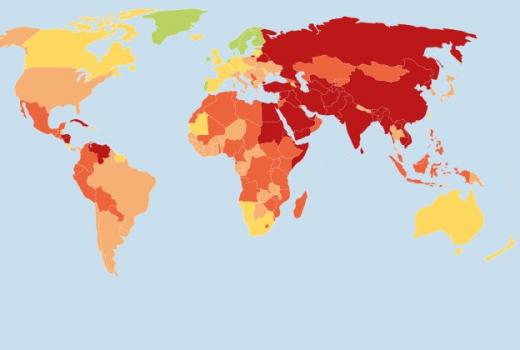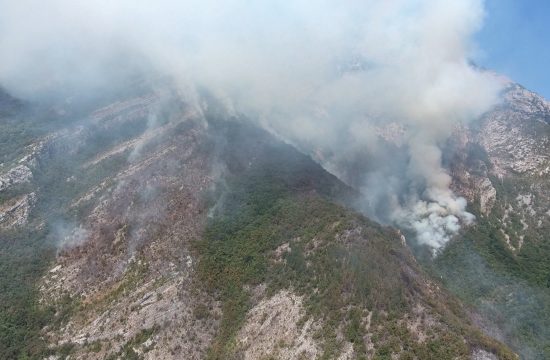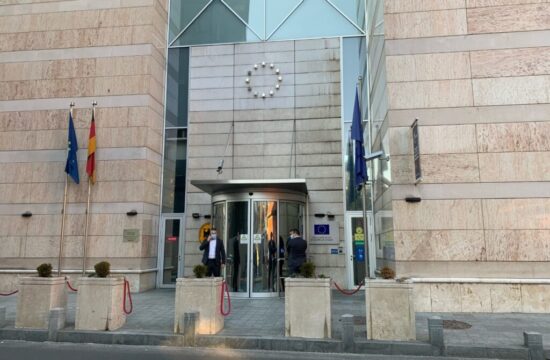
Bosnia and Herzegovina dropped seventeen places on the Reporters Without Borders (RSF) World Media Freedom Index this year and is now the 81st compared to last year when it was the 64th country in the world. Bosnia's position deteriorated the most on the list among all Western Balkan countries. Pročitaj više
The Index, which was published on the World Press Freedom Day, states that the recriminalization of defamation in Bosnia's Republika Srpska region poses a threat to journalism, which is already facing numerous obstructions across the country due to political and economic pressures and the fact that journalists do not feel safe. The Index also states that freedom of the press and the quality of journalism differ in different parts of Bosnia and Herzegovina.
The World Press Freedom Index shows that media freedom around the world is under threat precisely because of the authorities – those who are supposed to guarantee it. RSF states that an increasing number of governments are failing to fulfill their obligation to guarantee a free media environment and the people's right to reliable, independent and diverse news and information. The results show that there has been a decline in the political indicator, one of the five indicators used to measure media freedom, which refers to political pressures. This indicator dropped by 7.6 points globally.
“As more than half the world's population goes to the polls in 2024, RSF is warning of a worrying trend revealed by the 2024 World Press Freedom Index: a decline in the political indicator, one of five indicators detailed in the Index. States and other political forces are playing a decreasing role in protecting press freedom. This disempowerment sometimes goes hand in hand with more hostile actions that undermine the role of journalists, or even instrumentalise the media through campaigns of harassment or disinformation,” said said Anne Bocandé, RSF editorial director.
Almost all Western Balkan countries regressed
All the countries of the Western Balkans, except for North Macedonia, have fallen behind in this year's World Media Freedom Index. There is, however, a significant difference between Serbia, Bosnia and Herzegovina and Albania in relation to Montenegro and North Macedonia.
Albania is ranked 99th and has dropped three places compared to last year. Serbia is the 98th and has dropped seven places compared to last year. Montenegro is the 40th and has fallen by only one place, while North Macedonia has advanced by two places and is now ranked 36th. Of all the countries of the Western Balkans, Bosnia and Herzegovina has regressed the most this year.
There is a large number of media outlets in Bosnia and Herzegovina, including a few TV channels, that provide quality reporting and online media that engage in investigative journalism, but this number does not represent a true pluralism of information and opinions, according to RSF. Although the overall political environment is unfavourable for media freedom, there are significant differences throughout the country due to the different political structures of its two entities – Republika Srpska and the Federation BiH, with the media environment assessed as better in Sarajevo and the Federation entity compared to Republika Srpska entity, RSF said.
Politicians often attack journalists and put pressure on media regulators and public media to the extent that RTRS – public broadcaster in Republika Srpska entity is under political control, and BHRT – the state-level public broadcaster, is on the verge of financial collapse. Journalists are often the target of verbal threats and attacks, and sometimes physical attacks. Most journalists do not feel sufficiently protected while doing their work and do not trust the police or the justice system. However, RSF explains that various initiatives have been taken to improve the safety of journalists, including investigations conducted by the prosecutor's office.
The Index also states that the economic environment is difficult for journalists due to the small size of the market and the lack of sustainable funding. Bosnia and Herzegovina's media also suffer from divisions along ethnic lines and competition from media from neighbouring countries that belong to the same linguistic area. Due to the difficult economic situation and dependence on the political and economic sectors, a large number of media outlets avoid critical journalism in Bosnia and Herzegovina, according to RSF.





Kakvo je tvoje mišljenje o ovome?
Budi prvi koji će ostaviti komentar!